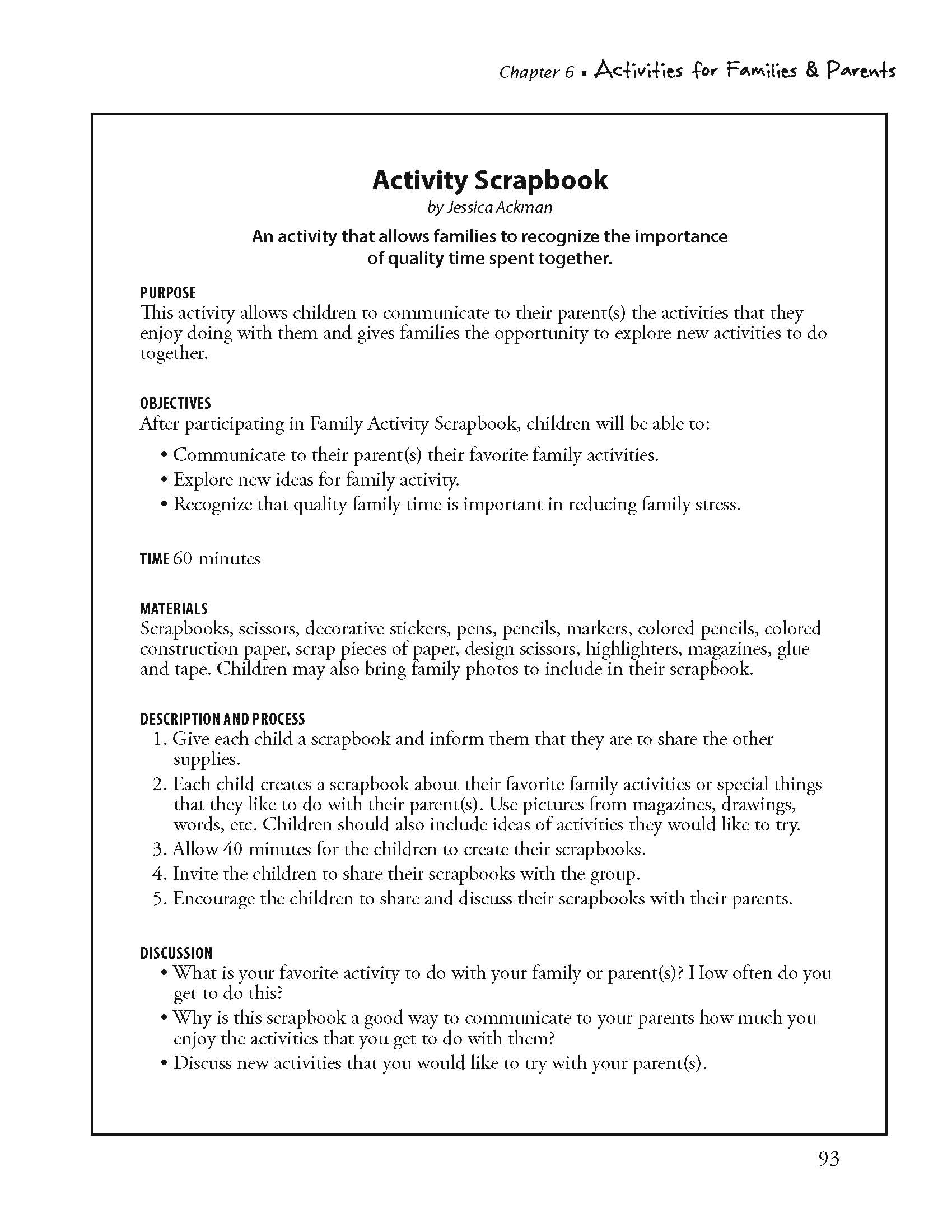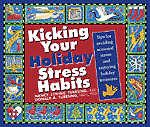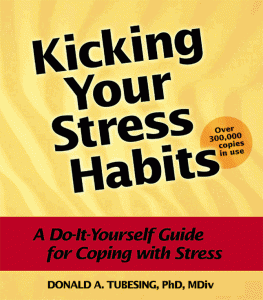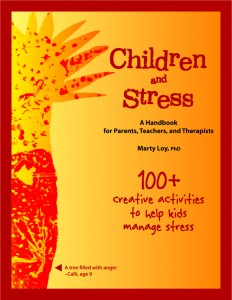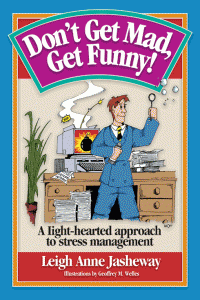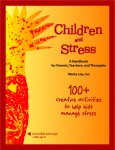 Find more wonderful activities for children and families in Children & Stress.
Find more wonderful activities for children and families in Children & Stress.
Stuffing yourself on Thanksgiving can add pounds
 I asked my husband what I should write about for Thanksgiving week and his immediate response was, “the turkeys in our lives.” After I stopped laughing I decided to focus on the real Thanksgiving turkey.
I asked my husband what I should write about for Thanksgiving week and his immediate response was, “the turkeys in our lives.” After I stopped laughing I decided to focus on the real Thanksgiving turkey.
To stuff yourself or not to stuff yourself on Thanksgiving, that is the question.
There’s a part of me that says, “Oh what the heck, it’s only once a year.” Then the responsible-me remembers how miserable I feel when I overeat. Plus, my husband and I have Thanksgiving, Christmas, both of our birthdays and our anniversary from mid November to New Year’s Eve. So we can careen from one reason to overdo it to another and find ourselves on January 1 feeling like stuffed turkeys.
To counter this, in early January every year for two days, we eat nothing but apples. We purge ourselves of all of the stuff we’ve eaten since my husband’s birthday. It feels good. I’ve been doing it since the late 1960s.
But I also consciously remind myself throughout the holiday season how uncomfortable it feels to overindulge. Plus I don’t want the added weight to add up over the years, which would require that I shop for new clothes, something I hate to do.
Remembering Aristotle’s Doctrine of the Mean phrase, “Moderation in all things,” can help, too.
Think of this immoderate estimate of how many calories the average American eats on Thanksgiving Day:
* More than 4,500 calories and 229 grams of fat! (Source: Caloric Control Council)
* The Council finds that most of these calories come from all-day snacking in front of the TV watching parades and football games.
* FYI: one pound equals about 3,500 calories.
The National Institutes of Health and the Medical University of South Carolina found that the average person’s weight gain over the holidays is just over one pound. So, it’s OK to eat anything and everything you want since one pound is not much, right?
But the researchers also found that 85% of study participants still carried that extra pound one year later. If you gain and retain an extra pound each year they’ll add up. Duh!
Striving for balance and moderation is usually good advice no matter the concern. So if you eat too much lefse (the Norwegian delicacy I make for my family) over the holidays try making it last longer than just for the holidays. If you drink too much alcohol maybe you should consider setting a limit on how much you allow yourself. If you feel uncomfortable when you overeat why not use a small dinner plate and fill it only once?
So, what, if anything, will you do to avoid overindulging on Thanksgiving? Whichever choices you make, make them conscious ones. Identify what would define moderation for you. Then over the holiday weekend and for the next month keep an eye on yourself (without obsessing) and set appropriate limitation on your excesses.
Above all, enjoy Thanksgiving and all that it represents.
Jacquelyn Ferguson, M. S., is an international speaker and a Stress and Wellness Coach. Order her book, Let Your Body Win: Stress Management Plain & Simple.
Stress Energy Economics
You are one person and you are subject to limited energy. Many of us use too much of our valuable energy when we don’t want or mean to. Overspending your energy is an unhealthy habit shared by a lot of us. If you panic when you can’t find your keys, or get angry when someone cuts in line, or you keep fighting a lost battle, you are overspending your limited energy. You can underspend your energy too. This would be something like if you were to allow a relationship to disintegrate, if you were turning a blind eye to something you could fix. Underspending and overspending are both problems.
You can see if you are wasting your stress energy, or not using enough of it by asking yourself three questions. First, does a threat really exist? Second, is the issue important? Third, can I make a difference?
If you answer no to any of these, it isn’t worth getting stressed over. If you answer yes to all of these, then it’s a good reason to use your energy.
- What sort of things are worth using your stress energy?
- What kind of things aren’t?
- How often do you waste stress energy?
Stress: A Matter of Perception
Stress can be caused by events, which will produce different reactions in each of us. Events are not good or bad within themselves, but our needs and experiences add context to them. The personal lens that we see events through can make them stressful.
Every day you face events that you either see as threatening or non-threatening. Which one it is depends on the perception habits you’ve learned. These are learned from a young age; you absorb them from people around you. If your parents fought about money, you’re likely to feel finances are stressful. There are many factors that change your perceptions growing up, like your peers, your geographic location, economic status, etc. If you judge an event as threatening, you’ll feel distress. Your unique perceptions change the amount of threat from an event; seeing a large dog may not threaten you at all, but may cause distress for your friend who was bitten by a dog. The amount of distress from an event will change, depending on the level of value you place on what’s being threatened. Maybe you don’t feel threatened by having to miss going out with friends for a work function. But if it were your best friend’s birthday you were missing for work, you would probably feel bad. Perception habits are hard to change, but being aware of them can help you reduce your distress.
- What kind of perception habits do you have?
Assess your emotions before a confrontation
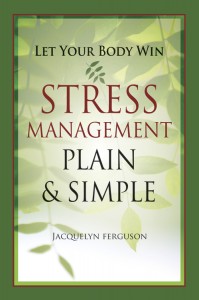 You swear you’re prepared to speak calmly and professionally to a coworker you believe is intentionally sabotaging you. But the second you open your mouth to say something, BAM! you’re practically yelling at him! The first moments of an encounter set the stage for the entire conversation and you know you’ve blown it. But how can you control your aggression?
You swear you’re prepared to speak calmly and professionally to a coworker you believe is intentionally sabotaging you. But the second you open your mouth to say something, BAM! you’re practically yelling at him! The first moments of an encounter set the stage for the entire conversation and you know you’ve blown it. But how can you control your aggression?
Use advice from the great book, “Crucial Conversations” by Patterson, Grenny, McMillan and Switzler (McGraw-Hill, 2002.)
Defensive emotions once engaged are difficult to turn off. And the more defensive you are the more convinced you are that you’re right, giving more fuel to your emotions. If you’ve blown it you may want to apologize and arrange to talk later after you privately take responsibility for your emotions. Here’s how.
Last week I wrote about the book’s advice to identify the other person’s behavior and ask yourself why s/he is behaving that way. Your answer is what actually causes your emotions, not the other person’s behavior. It’s vital to understand this so you can move beyond your defensiveness.
For example, you and I are working on a project together. I discover that you’ve met privately with our boss. Plus, when we both attend meetings you “hog” the time, making it seem like you’re in charge of the project, which you’re not.
“Why” do I think you’re hogging the limelight and excluding me from meetings? My answer: “Because you want all of the credit.” Doesn’t this assumption fuel my anger and resentment?
But just because I believe this doesn’t make it true. If my “why” answer is defensive and judgmental, which it is, I need to identify your behaviors and the facts of the situation before speaking to you.
* Fact/behavior: you had two meetings with the boss that I wasn’t notified of so couldn’t attend. You didn’t inform me later either.
* Fact/behavior: when we presented our idea together you spoke for several minutes while I spoke far less.
Separating the facts and your behaviors from my assumption that you want all of the credit balances me emotionally. I feel more in the driver’s seat of my own life, which decreases my stress therefore my defensiveness. I can assertively speak to you by using this formula:
1. State the facts from my point of view;
2. My interpretation of their meaning;
3. How I feel about it;
4. Ask if I understand correctly.
E.g., “Tom, you didn’t inform me of the meetings you had privately with the boss. This makes me think excluding me was intentional. I felt resentment and was hurt by this. Was I purposefully excluded and if so, why?”
Substituting my assumptions (“hogging” and “wanting all the credit”) with the facts of the situation including your behavior plus using this formula to address my concerns can help balance me so I’m less likely to become instantly defensive.
Next week we’ll look at additional ideas to improve your ability to handle your “crucial conversations.”
Jacquelyn Ferguson, M. S., is an international speaker and a Stress and Wellness Coach. Order her book, Let Your Body Win: Stress Management Plain & Simple.
Anger may be an emotional castle built on sand
The Importance of Crucial Conversations
Jacquelyn Ferguson, MS
Do you avoid difficult workplace (or personal) conversations where you fear the outcome will be uncomfortable? If so, read “Crucial Conversations” by Patterson, Grenny, McMillan and Switzler (McGraw-Hill, 2002.)
According to these authors an organization’s effectiveness is strongly determined by its employees’ willingness to have crucial conversations. They found in the worst organizations poor performers are ignored then transferred. In good organizations supervisors eventually handle problem situations. In high performing organizations’ employees willingly and effectively speak to someone who fails to deliver on promises. Everyone is held accountable regardless of their level.
Difficult conversations usually trigger your stress cycle; therefore defensive behavior (my words not theirs,) bring out your worst behavior (their words). What’s your worst behavior? It’s not pretty, is it? You’d probably be as embarrassed as I to have people you respect see you behave that way.
To move beyond your automatic, defensive reactions and your worst behavior determine what – or whom – is actually causing your problem. Is it really that co-worker who aggravates you so, or might it your own interpretation of that person?
I’ve frequently written about how negative judgments of others trigger your worst behavior. These authors approach this formula differently, which may help you see that your own interpretations determine your emotional reactions and behavior.
Their advice is to ask yourself why the other person is behaving as he is. A simple example from a program I recently presented, “Collaborative Communication.” During our lunch break an attendee had to wait a long time at a Subway shop where there was only one employee working. He was doing his best and actually, according to my attendee, was doing quite well. He waited on four people at a time, taking each sandwich through the same steps together. All four customers had to wait for all four sandwiches to be made together.
Upon his return to our classroom, my attendee explained his own impatience was because the employee was disorganized (negative judgment). In my attendee’s mind, it was the employee’s disorganization that made the attendee impatient. Another attendee offered a different perspective. She suggested that the Subway employee probably didn’t want to take off and put on his plastic gloves repeatedly, so he made multiple sandwiches together. My attendee thought this seemed a likely explanation and said he probably wouldn’t have been impatient if he’d looked at it that way.
In other words, the label “disorganized” is what caused the attendee to become impatient, not the Subway employee’s system.
Who drives you the most nuts? Why is that person doing what he’s doing? Your explanation, your “why,” triggers your emotions therefore you reaction. The other person doesn’t make you feel as you do, therefore cannot be responsible for your reaction.
To have an important conversation that you’re now avoiding, prepare for it by asking yourself, “What’s your problem person’s behavior and why is he acting that way?” Next week I’ll address how to handle your negative why.
Jacquelyn Ferguson, M. S., is an international speaker and a Stress and Wellness Coach. Order her book, Let Your Body Win: Stress Management Plain & Simple.
Wellness Coaching Reviews
 INSPIRING, INSTRUCTIVE, INDISPENSIBLE
INSPIRING, INSTRUCTIVE, INDISPENSIBLE
“Inspiring because Dr. Arloski strengthens my belief that we can help people get past the obstacles that keep them from seeking a deep sense of wellness. And because he teaches us how to inspire positive change in others.
Instructive because the book shows us the psychological stages people pass through as they attempt, and hopefully succeed, at creating lasting lifestyle change; we just need to stay with them as they move along the path.
And indispensible because it’s the perfect handbook for health and wellness professionals to keep handy; to remind themselves to review the steps, to stay with the client where they are and to ride out the waves of change with patience, compassion and joy.”
-Suzanne Ballantyne
A book to come back to time and again
“If you are a Health and Wellness Coach you will want to have this invaluable book by your side. I’ve read just about every book there is on health and wellness coaching, I’ve even written one myself and this is still the best.
-Anne Marshall, Author of The Health Factor: Coach Yourself To Better Health
To be happy consider strengths
Live, appreciate your strong suits
By Jacquelyn Ferguson, MS
Dr. Martin Seligman, University of PA author of “Authentic Happiness” and a Positive Psychology pioneer, says happiness is strongly enhanced by three factors:
* Feeling better about your past;
* Thinking more optimistically about your future;
* Experiencing more contentment in the present.
To be happier in the moment Seligman advises you to avoid shortcuts to happiness: sensory experiences accompanied by strong emotions (ecstasy, orgasm, thrills, delight,) like eating hot fudge sundaes, having sex, or watching spectator sports. These pleasures give you upticks in happiness but fade quickly.
It’s much better to seek gratifications, which are activities you do for the sake of doing them. They involve thinking and require stretching your skills to improve.
Gratifications will bring you greater ongoing happiness when they are an expression of your signature strengths. (Take Seligman’s VIA Strengths Survey @ www.authentichappiness.org to discover your own.) All of these strengths are very positive. Living your life expressing your top five or so makes you much happier – so much so that you can stop focusing on fixing what’s supposedly wrong with you. Wouldn’t that be refreshing? These strengths include:
Wisdom and Knowledge: Courage:
Curiosity Valor
Love of learning Perseverance
Judgment Integrity
Ingenuity
Social intelligence
Perspective
Humanity and Love: Justice:
Kindness Citizenship
Loving Fairness
Leadership
Temperance: Transcendence:
Self-control Appreciation of beauty
Prudence Gratitude
Humility Hope
Spirituality
Forgiveness
Humor
Zest
For example, my top five strengths identified by taking his assessment two years ago and again recently, are:
* Integrity;
* Curiosity;
* Zest;
* Loving;
* Gratitude;
These strengths have strongly influenced my choices, thereby my happiness.
- Integrity: Hopefully those who know me well would say that I have integrity. Just a small example is that lying is virtually impossible for me. I also deliver what I promise, etc.
- Curiosity: I love my work and have great curiosity in all the workshop and speech topics I present (not to mention this column.) In fact, I won’t present topics that don’t interest me.
* Zest: Researching areas that fascinate me gives me great zest or energy and passion for presenting information to others. - Loving: I’m fortunate to have a wonderful husband and great friends and family. Throughout my entire life I’ve had abundant loving relationships.
- Gratitude: All of my life I’ve been a very grateful person, which is an effective buffer against depression, according to Seligman.
- I truly have a great life; and not because of money or possessions nor quick pleasures – although I do love watching MN Vikings’ games. My happiness and contentment come from living what is to me an interesting life; one of my own choosing and designing, therefore authentic.
Identify your own signature strengths by taking Seligman’s assessment, then figure out how you already live these and consciously appreciate that. Seek even greater happiness by looking for additional ways to express your strengths. If authentic happiness is your goal, living your strengths is your strategy.
Jacquelyn Ferguson, M. S., is an international speaker and a Stress and Wellness Coach. Order her book, Let Your Body Win: Stress Management Plain & Simple.
Turn Your Holiday Traps into Holiday Treasures
Holiday Traps or Holiday Treasures
From Kicking Your Holiday Stress Habits
By Donald Tubesing, PhD, MDiv & Nancy Loving Tubesing, EdD
Do eagerly look forward to the holidays? Does your creative, not to mention spiritual, energy expand?
Or are your holidays filled with too many “shoulds” that exhaust you?
Take this assessment to identify your Holiday Traps and Holiday Treasures so you can continue the treasures to reduce your holiday stress and change the traps that add stress to your already too-busy life. Circle true or false for each. If it’s difficult to decide, estimate which answer would be 51% true of you.
1. You lose control over your activity calendar saying “yes” to all invitations and requests. Each carries a “social obligation” burden and can overwhelm you. Or the opposite, you sit at home waiting for someone to include you, which doesn’t happen so you’re all alone again.
True False
2. Gift giving is a creative activity for you. You excel at looking through your receivers’ eyes to select something very appropriate for each. You enjoy the planning, shopping and the wrapping of each gift, as well as their appreciation of your choice.
True False
3. You live far away from your family of origin and cannot make it home for the holidays and will deeply miss your family’s holiday traditions. How depressing. OR You and your new mate both have your own treasured holiday traditions. In an attempt to make you both happy you work hard to meld them together, which is more confusing and exhausting than it is comforting and enjoyable. Why does he have to have potato pancakes on Christmas morning? Why can’t he give that up?
True False
4. You love to decorate your home for the holidays. All of the festive sights, smells and sounds energize you. You love hearing from loved ones far away through their cards and can hardly wait to visit and celebrate with those closer to home. It’s all so magical and loving.
True False
5. You give the gifts you hope to receive, while at the same time fear you won’t get what you want. You want so many things and can’t prioritize your preferences. You tend to measure others’ love for you by how many gifts and the expense of each they give to you.
True False
6. You love the busyness aspect of the holidays because it fills you with a sense of purpose and worth. All of the social gatherings reconnect you with your support system that you hold dear. Plus, the extra commitments help you appreciate the solitude and silence when they return.
True False
7. You dread gathering with your family of origin for the holidays knowing that the same old conflicts and pressures will reappear. Your older siblings treat you like you’re still their little sister while your parents trigger everyone’s defenses just like they always have. What a pain!
True False
8. Making the holidays perfect is important to you. Your house, the food and the gifts must be memorable and appreciated. But every year you feel let down when reality doesn’t match your Madison Avenue expectations. You expect yourself to feel loving, joyous and peaceful but find yourself feeling lonely, sad and discouraged.
True False
9. One of the many reasons you so enjoy the holidays is that they allow you to get back in touch with your childlike past imbuing the festivities with magic and meaning. You love all of the sights and sounds and the comfort they bring you. You enjoy celebrating your heritage and affirming the love that connects you no matter what has transpired.
True False
10. The holidays allow you to get in touch with the meaning in your life. The rituals and traditions stimulate spiritual reflection and centering as well as a sense of playfulness, excitement and wonder. You know the traditions can help you through the difficult times even when your feelings don’t quite match the occasion.
True False
Scoring directions
Check out whether your “true” answers indicate a trap or a treasure.
| “True”
Answers |
“True”
Answers |
||
| Santa Claus Trap | Item #5 | Santa Claus Treasure | Item #2 |
| Activity Trap | Item #1 | Activity Treasure | Item #6 |
| Tradition Trap | Item #3 | Tradition Treasure | Item #10 |
| Life Script Trap | Item #7 | Life Script Treasure | Item #9 |
| Magic Trap | Item #8 | Magic Treasure | Item #4 |
1. Santa Claus Trap to Santa Claus Treasure
Gift giving can be fun but can become a major holiday hassle; it takes time when you’re stretched thin already and in today’s economy who can afford them? To help move you from trap to treasure answer these questions:
- What kind of gift giving would be meaningful to you and to your recipients?
- What would help your heart and soul – and theirs – feel refreshed?
Give meaningful gifts:
- Make a gift instead of buying it;
- Give your time and attention in some way;
- Don’t just give tickets to an event but go along and share the experience;
- Give a gift of affirmations, memories, thanks;
- Donate blood, give groceries to a food bank; give an exhausted mother an afternoon of child care, or help a neighbor in need.
- Put yourself on your gift list, too. Treat yourself to a gift that’s perfect for you.
Also, learn to ask for what you want. Don’t be a closet hinter. If whoever it is you’ve hinted to in the past hasn’t gotten it, what makes you think s/he will this year? Don’t expect others to read your mind. Speak up. For example, if you’re lonely, ask someone to share your celebration – or ask to participate in theirs. If you need time alone in the middle of all of the holiday togetherness, say so.
Helpful hint: if you can’t get what you want, want what you get; it’s much more satisfying than wishing for the impossible.
2. Activity Trap to Activity Treasure
It is startlingly easy to get caught up in the Activity Trap over the holidays. You have your own expectations of yourself and of others, as does everybody else.
Start by listing all of the things you want to accomplish before and during the holidays then cross out the unnecessary activities.
- Identify your top priorities and make time for them, even if that means something else gets tossed out. Remember, if everything is a priority then nothing is.
- What energizes you? Do more of these activities, while doing less of what drains you.
- Do your unpleasant tasks as quickly and painlessly as possible, then reward yourself. Refuse to suffer.
- Keep for yourself the activities you enjoy, even if they aren’t essential or could be done by others. You need them. They nurture you.
- When you’re being a slave, lighten your load. When the guests arrive use this great idea from a workshop participant:
Before anyone arrives, write down all the little jobs it takes to host a wonderful gathering on small and colorful, festive pieces of paper. Fold them and put them into a bowl.
As your guests arrive invite them to draw one task from the bowl and agree to take on the responsibility. Present this idea in a cheerful way.
Include everything you can think of: set the table, recycle empty cans and bottles, clear the table for doing dishes, bring out after-dinner coffee, etc.
Then observe how virtually everybody enthusiastically jumps into their assigned job and enjoys the teamwork and camaraderie this creates. If anyone resists they won’t for long when they see how willingly everyone else participates.
You can also turn obligations into energizers by creatively updating them. Any new approach can energize you.
- Instead of sending out holiday cards, write a compliment to each friend rather than a history of the past year.
- Surprise some people on your list with a brief, long distance phone call.
- Fill out your holiday cards at the library, a favorite restaurant or someplace enjoyable to you.
3. Tradition Trap to Tradition Treasure
Some traditions are worth continuing, others definitely need to be pitched, while still others can be tweaked and made better.
- Which tradition from your past would you like to resurrect? Maybe it’s singing holiday songs before dinner? Or attending a religious ceremony together. Or volunteering at a soup kitchen. Make sure participating in this tradition lifts your spirit versus depresses you with yet one more obligation.
- Ask friends about their traditions and adopt an appealing one for yourself.
4. Life Script Trap to Life Script Treasure
Do you feel trapped in the roles you play in life: the always giving mother, the always providing father, the always good little sister or brother?
Be aware that when you return to your family of origin for any reason, not just for the holidays, that it is interestingly common for all to revert to the roles they each had during those years. Big brothers boss more; little sisters please more, etc.
Give yourself permission to feel whatever you feel. Don’t feel what you “think you should feel” or “wish you felt.” Trying to deny or manipulate your feelings, or act contrary to them only distances you from yourself. Not that you need to confront everyone who’s upsetting to you at the moment of upset, but if you would more frequently tell people how you feel about what they’re doing in an assertive fashion, more conflicts would be resolved more quickly.
Which situations or people trigger your regressions the most? Prepare for these by creating a mantra to say to yourself before, during and even after your gathering. For example, let’s say your Uncle Sid is a boorish man who loves to argue politics with anyone who will accommodate him. When he picks on you your automatic reaction is to get defensive and loud. Follow these three steps to respond to him the way you want:
1. What is your goal? For example, to avoid getting negatively hooked by Uncle Sid
2. To achieve this goal how do you need to be? Calm, relaxed, accepting of him and gracious no matter what he says.
3. Affirm this over and over again. “I’m calm and relaxed, accepting and gracious.”
Repeat this to yourself a hundred and more times before you’re with him, deep breathing as you do. This will prepare you. While you’re in his presence repeat it to yourself again. When you feel you’re getting hooked, repeat it in your mind again over and over while slowly deep breathing.
5. Magic Trap to Magic Treasure
There are no perfect holidays – for anyone. If you think others experience them then you are experiencing the Magic Trap. Magical thinking tends to be all or nothing thinking. Everyone is perfectly happy all of the time or they’re miserable. It’s never that stark.
Which holiday expectations do you have that go typically unmet? Unmet expectations are often unrealistic to begin with; no one could satisfy them. So, for example, if you want everything to be perfect the day of your holiday celebration it’s your expectation that’s your problem. Accept what is. Realize that your need for perfection can cause the very problems you later feel depressed about. Those around you can feel your too-high expectations and rebel. Learn to accept each person as he or she is. Don’t expect behavior from them that they historically haven’t shown. So if your brother is always late for the celebration, let him be late. Don’t take it personally. Accept that this is a part of him for whatever his reasons.
Which holiday expectations fill you with joy historically? If it’s planning and obtaining everyone’s gifts and you do this throughout the year, do it and enjoy it.
The degree to which you turn your traps into treasures will be the degree to which you lower your stress and truly enjoy the season.
From Kicking Your Holiday Stress Habits by Donald A Tubesing, PhD, MDiv, and Nancy Loving Tubesing, EdD.
How to become more optimistic about future
Can I learn to be Optimistic?
By Jacquelyn Ferguson MS
Would more money, a nicer house or better health make you more content? Are these the same things that satisfy happier people, too? If not, what can we learn from them to become happier ourselves?
The Positive Psychology movement finds that you’ll get the most bang for your happiness buck by changing how you:
* Feel about your past
* Think about your future
* Experience your present
So let’s look to your future.
Future-oriented positive emotions include:
* Optimism
* Faith
* Hope
* Trust
You must be fairly optimistic for these emotions to augment your happiness. Optimism is hope about your prospects. In these tough times it’s more difficult to remain hopeful, yet many do.
Dr. Martin Seligman, the University of PA pioneer of Positive Psychology, author of “Learned Optimism” and “Authentic Happiness,” and world renown optimism/pessimism researcher, has shown through extensive research that optimists and pessimists interpret events very differently. Pessimists are more realistic but optimists are more resilient, healthier and may live longer, and are better at work and in sports.
Seligman has narrowed down becoming more optimistic to changing how you explain why good and bad things happen to you through two dimensions of your “Explanatory Style:”
* Permanence versus temporary: for how long do you give up?
* Pervasiveness – universal versus specific: how much of your life is affected by events?
Permanence vs. temporary: Pessimists see causes of bad events as permanent, such as not getting a job interviewed for – “I’m all washed up.”
Optimists use temporary terminology to explain “I wasn’t on for that interview.”
Whose stress lasts longer? Who’s going to give up more easily? Being washed up sounds very permanent.
Pessimists also use expansive and exaggerated words like “always” and “never” such as “I’ll never get a job.”
Optimists use “sometimes” and “lately” such as “I’ve had some bad interviews lately.”
Opposite terminology is used when something good happens.
Pessimists use temporary terminology to explain why something good happened – “I’m lucky to get this job.”
Optimist use permanent causes for good events – “I’m the best candidate for this job.”
The second dimension of your Explanatory Style is Pervasive: how much of your life is affected by an event?
For bad events pessimists explain with universal terms and may feel helpless in multiple areas of their lives, like not getting the job:
* “I’m such a loser.”
Optimists use specific explanations and limit any helplessness to the bad event – “I wasn’t feeling well that day.”
Who is more resilient for the next interview?
Pessimists use specific reasons to explain why something good happened – “I got the job because I’m good at math.”
Optimists use universal reasons – “I got the job because I’m smart.”
So, to become more optimistic and happier about your future explain bad events with temporary and specific causes and good events with permanent and universal ones.
Jacquelyn Ferguson, M. S., is an international speaker and a Stress and Wellness Coach. Order her book, Let Your Body Win: Stress Management Plain & Simple.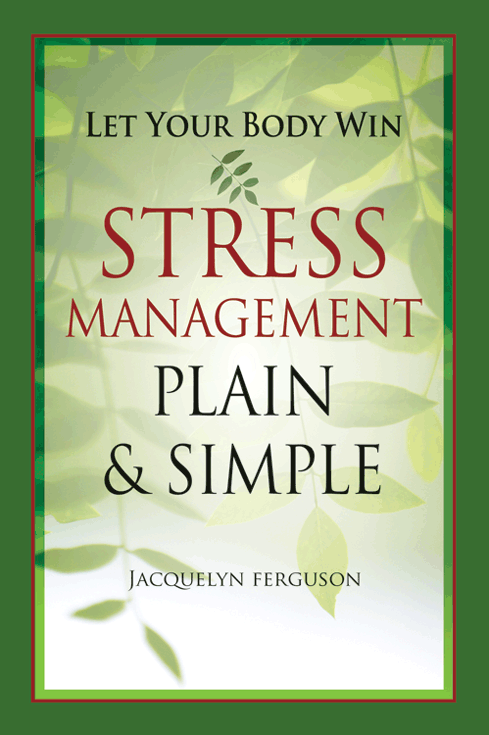
Relabeling – Another Angle on Stress
Relabeling – A positive coping skill
From Kicking Your Stress Habits
By Donald A. Tubesing, PhD, MDiv.
You wake up. You’re in a good mood for a Monday. You get ready for work and head out the door. Three hours later, your head is on your desk and you want to go back to bed. What went wrong? You may not realize you assigned an event a good or bad value until you find yourself stressed and wondering that very question. What did go wrong? Thinking back, you see that you started feeling stressed when a friend you work with walked by without saying hello. After that, you started feeling gloomy.
So, you’re feeling threatened because you fear that you’ve lost the respect of a friend. In this situation, you can try relabeling—looking at an event from another, more positive point of view. Rather than instantly jump to the conclusion she was ignoring you, think about other reasons she may not have noticed you. Maybe she was on the phone, or had a headache. When you’ve calmed down, you can asked her about it. Most likely, there was no actual threat, and relabeling can help you calm down enough to see that.
Relabeling is not always right. While you can relabel some situations, don’t relabel getting mugged as meeting someone new. When you identify a threat, you will know it; use the adrenaline boost from the stress to get out of the situation, or fix it.
Negative Coping Skills
Negative Coping Skills
From Kicking Your Stress Habits
By Donald A. Tubesing, PhD, MDiv
How do you handle stress? The different ways we tackle stress are called coping skills. There are two kinds of these skills. Positive skills are ones that energize you, like exercising or laughing with a friend. The other set are negative skills that leave you feeling worse, like drinking or ignoring your stress.
Say you react to stress by turning a blind eye to it. You will end up drained from all the effort you’re putting into ignoring your stress. This only makes you feel worse, leaving you with even less energy. See the pattern? You have less energy and you still haven’t solved your problem. The drained feeling you get from stress can lead to illness—up to 90% are caused by stress alone! Can you imagine being sick 90% less? Consistent stress can cause peptic ulcers, chronic headaches, anxiety, high blood pressure, and even heart disease. Thinking about that alone is downright stressful! On the other hand, if you choose a positive coping skill, you will regain energy rather than just spending it. Then you have more energy to put into things you enjoy, which will help you relax even more. This is also a pattern, but an infinitely better one.
- What kind of coping skills do you have?
- Are they positive or negative?
- Have they changed over the years?
~For more information on this subject, click here.
Emotional Masks Exercise
Emotion Masks
by Amy Nuelk
An activity for sharing feelings when a child loses a loved one
From Children and Stress by Marty Loy
PURPOSE
Emotions and feelings are an integral part of everyday life. When children lose a loved one, they may feel very sad or even angry about the situation. This activity is designed to allow children to recall memories they have about a recently deceased loved one through
story telling and discussion with others who are experiencing a similar situation.
OBJECTIVES
After participating in Emotion Masks, children will be able to:
• Openly discuss memories they have about a lost loved one .
• Effectively relieve stress children may be feeling as a result of the death of a loved one.
• Recognize that others in similar situations may be experiencing the same emotions.
TIME 30–45 minutes
MATERIALS
Old magazines, scissors, glue, paper plates (3 per child), Popsicle sticks.
DESCRIPTION AND PROCESS
The children are asked to recall three different emotions. Have them look through
magazines and cut out pictures that illustrate each of the three emotions. Each picture is
glued to one of the three paper plates, which will become emotion masks. The children
are invited to share a personal story or experience they had with the deceased loved one
that involves each of the three emotions.
1. Each child receives three paper plates and three Popsicle sticks
2. The children look through magazines and find a picture that portrays each of three
distinct emotions (For example: anger, sadness, joy, etc.)
3. Glue each picture to a paper plate and glue a Popsicle stick to the back of each plate
4. The children are invited to share each of their emotion masks and discuss why each
emotion was chosen. They can also describe an experience they had with the deceased
loved one that included that emotion (For example: “I was always really happy when
Grandma and I used to bake chocolate chip cookies together.”)
5. Allow time for participants to engage in discussion with others.
DISCUSSION
• What did you learn by participating in this activity?
• Describe how you feel today about the memories you shared with your loved one.
• Who, if anybody, do you talk to during times when you are experiencing
emotions related to losing your loved one?
• Discuss how you could help a friend cope with losing a loved one.
If you’re interested in more exercises from the book Children & Stress by author Marty Loy, PHD, click here.
Signs of Stress
Signs of Stress
From Kicking Your Stress Habits
By Donald A. Tubesing, PhD, MDiv
You’re already very familiar with some stress symptoms, but distress can cause a wide range of conditions. Maybe you have some that you didn’t know are stress related. There are five categories the common warning signs of stress can take; physical, emotional, spiritual, mental and relational signs.
| Physical Signs | Emotional Signs | Spiritual Signs | Mental Signs | Relational Signs |
| Appetite Change | Anxiety | Emptiness | Forgetfulness | Isolation |
| Headaches | Frustration | Loss of meaning | Dull senses | Hiding |
| Fatigue | Feeling blue | Doubt | Low productivity | Resentment |
| Insomnia | Mood swings | Acting Unforgiving | Negative attitude | Loneliness |
| Weight Change | Bad temper | Martyrdom | Confusion | Lashing out |
| Illness | Nightmares | Searching for miracles/magic | Lethargy | Intolerance to other’s feelings |
| Muscle pain | Crying spells | Loss of direction | Whirling mind | Clamming up |
| Indigestion | Irritability | Cynicism | No new ideas | Lowered sex drive |
| Pounding heart | Easily discouraged | Blaming others | Boredom | Nagging |
| Accident prone | Depression | Apathy | Spacing out | Distrust |
| Teeth grinding | Nervous laughter | Intolerance to others’ faith | Mental bullying | Lack of intimacy |
| Skin outbreaks | Worrying Excessively | Feeling abandoned | Feeling stupid | Using people |
| Restlessness (eye twitching, foot-tapping, finger-drumming) | Feeling like no one cares | Needing to prove self | Poor concentration | Less contact with friends |
| Increased drug, alcohol, tobacco use | Feeling happiness is just out of reach | Challenging a higher power | Feeling useless | Fear of betrayal |
- What stress symptoms have you experienced that you didn’t know were stress related?
- What are you experiencing now?
- Is there a category (emotional, relational, etc) that you have more symptoms in than the others?
Adjusting to Autumn
Adjusting to Autumn
By Julie Lusk
Adjusting from summer to fall always comes with mixed feelings for me. At first, it’s so hard for me to accept the end of the warmth, light, and the greenness of the plants, trees and garden. “Where did it go,” I ask my self. “I’m not ready for this!”
Honestly, for years and years, I’d feel mighty bummed. In my mind, I was already jumping way ahead to the shivering cold and darkness of winter while missing all the things I like about summer. Somehow, I’d let myself miss out on what the autumn is all about.
But now, I close my eyes and I sit in yoga meditation. Eventually, my racing mind settles into the steadiness of my breathing and the present moment opens up like a fragrant flower. Instead of feeling sorry that another summer is gone and anticipating an uncertain future, I’m able to take in what’s around me now. When my eyes reopen, it’s easy to notice that the trees aren’t bare. In fact, the air is crisp and clean and the changing light and shadows cast a beautiful spell over me. What a relief.
All that energy that was being wasted on feeling anxious has effortlessly shifted into the energy of inspiration and an undeniable readiness to take what’s right before me and enjoy it for what it is. For years, I missed out on all the gorgeous fall days. Not anymore. Now I’m grateful for the tastes and smells and colors of autumn and reach into my closet for my favorite sweater.
Autumn is a time for harvesting, letting go, and for preparing unsown areas for reseeding. This goes for the actual activities that happen during this season on earth and for what happens in our lives. For me, the magic ingredient that helps me with this is yoga and meditation. Please join me or your favorite teacher so we can continue to grow inward and onward.
~For books from author Julie Lusk, click here.
Depression more common now
Effort-driven rewards are more meaningful than short-term pleasures
By Jacquelyn Ferguson, MS
Isn’t it odd that depression in America increased along with our affluence? Shouldn’t it work the other way around? Is there something in our relatively prosperous lifestyle that’s an actual cause of depression?
The pioneer of Positive Psychology, Dr. Martin Seligman of the University of PA, described two studies conducted in the 1970s in which people of different generations reported on their lifetime episodes of depression.
One might assume that the older generation would have more incidents of depression because of experiencing far more hardships from the Great Depression and two world wars, not to mention having lived longer.
But the opposite was true. Younger people were much more likely to have experienced depression. In fact, one study found that those born in the middle third of the 20th century were ten times more likely to suffer from major depression than those born in the first third of the century.
Here are two reasons that may help explain.
Lifestyle differences: older generations were far more physically active than younger ones. Think about some differences:
- Today it’s throw-away diapers; yesterday it was cloth diapers that were soaked and washed;
- Today you buy microwavable, ready-to-eat meals; yesterday, they grew, hunted, and prepared their own food;
- Etc.
Why might modern life along with its hi-tech gizmos, cars and microwaves be part of the soaring rate of depression? What might we have lost when we went from labor-intensive lifestyles to our sedentary ones?
“Our brains are programmed to derive deep satisfaction and pleasure when our physical effort produces something tangible,” says neuroscientist and psychologist Kelly Lambert, writing in Scientific American Mind (and author of “Lifting Depression: A Neuroscientist’s Hands-on Approach to Activating Your Brain’s Healing Power, 2008.) She calls our ancestors’ hard work “effort-driven rewards.” They had greater appreciation of their efforts producing their necessities, which very importantly gave them a greater perception of control, more positive emotions and maybe protection against depression.
Other social scientists have suggested a contributor to the greater affluence/higher depression formula has to do with modern humans taking short-cuts to happiness. With increased disposable income and leisure time we bought more things (note the past tense) that brought us pleasure. But pleasures are short term enjoyments. They are sensory experiences accompanied by strong emotions (ecstasy, orgasm, thrills, delight,) like eating your favorite foods, sex or watching spectator sports. Investing more energy into pleasures gives you frequent upticks in happiness, but they fade quickly.
It turns out that we’re happier and less depressed when we seek gratifications. These are activities you do for the sake of doing them. They:
- Involve thinking;
- Are an expression of your strengths;
- Stretch your skills to improve;
- Are often considered “flow” activities;
- Gratifications also lead to an increase in important, positive emotion boosting neurochemical releases which improves mood.
Consider fighting the blues and depression by seeking fewer short-term pleasures and more meaningful gratifications. Next week I’ll address identifying your strengths that are at the core of these gratifications.
Jacquelyn Ferguson, M. S., is an international speaker and a Stress and Wellness Coach. Order her book by clicking here.
What is Stress?
What is Stress
From Kicking Your Stress Habits
By Donald A. Tubesing, PhD. MDiv.
When you think of stress, what comes to mind? A deadline, some bad news, a hectic schedule? What about a party, a promotion or a holiday with family? These events are stressors that create the physical and mental feelings we all know too well — the anxious grinding in the pit of your stomach, the headaches, the moments of panic. Stress is more than a negative force. In fact, good stress can be a boost to help you overcome challengers and meet goals. Positive stress, called eustress, can add some excitement to your day and help you focus.
While life would be pretty dull without any stress, too much bad stress is destructive. This is distress — what you’re feeling when you’re stretched too thin or something traumatic happens. Both good and bad stresses are part of daily life. As Donald Tubesing puts it in his book, Kicking Your Stress Habits, we are all like violin strings; each of us needs a little tension to make music, but not so much that we snap. Each of us has to find a balance to be happy and healthy. What kind of stress adds zest to your life? What bogs you down? And how do you know when it’s too much? These are questions you can find out for yourself with just a little thought and time.
Fun Five-Minute Stress Breaks
Stress Breaks – Quick and Fun
By Leigh Anne Jasheway
Have you ever eaten a frozen dinner without thawing it out first? The last time you had your blood pressure measured, did the cuff explode? Are there teethmarks in your steering wheel? Is Tums® your favorite pizza topping? Then you just might be over-stressed!
Chances are if you’re a woman and you’re still alive, you’ve got more stress in your life than you need. But you probably don’t have a lot of time to manage it either. If you’ve ever fast-forwarded through a relaxation CD, you know what I mean. What you need are quick, easy, and FUN stress breaks you can squeeze in between your family, your job, your social commitments, and that nice long coma you’ve scheduled instead of a vacation.
Try some of these:
1. Stop on the way home from work and read funny greeting cards. There are so many different types of humor in greeting cards, you’re bound to get a quick laugh – and laughter is one of the best ways to release your stress and move on.
2. Give the family pet a rubdown from ears to tail. Studies show that not only will your blood pressure and heart rate slow down, so will your pet’s!
3. Keep a gel-pack in the freezer and when the tension of the day shows up in your neck, tell it to chill out!
4. Prune an unruly plant. If you can’t control your boss or your kids, at least you can get a plant to behave!
5. Burn a candle in a scent that soothes, like vanilla or chocolate chip. If burning a candle isn’t advisable (if you’re in the car, for example, and might start a fire on your dashboard), spritz a room freshener in the same scent.
6. Get a coloring book and color outside the lines. And always ask for your own crayons at restaurants that offer them to the kids.
7. Take a walk around the block and see how many things make you laugh.
8. Clean out one drawer in your house. You’ll get a sense of accomplishment and no matter what else went wrong today, you can at least feel slightly more organized!
9. Write a love letter to one of your kids to stick in his or her lunch. Turning your mind to the delightful things about your family instead of the crazy-making things can help you feel less overwhelmed.
10. Grab a jar of Play-Doh or some modeling clay and squish it through your fingers. Imagine you’re squeezing the stress right out of your day. It works for young children!
11. Start a “Best Things” journal. Every day, write down the best thing that happened to you all day. It doesn’t matter how big or small; the idea is to focus on the positive and let go of some of your negative energy.
12. Use a lip balm or stick scented with relaxing essential oils such as lavender, chamomile, and green tea. Or one that just makes you smile – try chocolate or bubble gum (you can find some at Chocolate-sensations.com or Adorebeauty.com)
13. Close your eyes and visualize yourself in a moment when you laughed so hard you couldn’t stop, like that time you walked down the hall with the toilet seat cover tucked in your pantyhose. You’ll probably get a good laugh again just thinking about the moment.
14. Teach your kids your favorite childhood game. It’s hard to stay focused on the problems of the day when you’re playing Red Rover or Twister™.
15. Sing in the shower. Singing is a great way to release tension and letting the water wash away your cares at the same time doubles the stress-managing impact. Besides with the water running your kids won’t be able to complain about your version of Girls Just Want to Have Fun!
16. On your next break at work, swap neck and shoulder massages with a co-worker. If you work at home, do it with a neighbor or one of the kids.
17. Talk in a softer voice. Don’t whisper because that will actually strain your vocal chords. But if you talk softly (no big stick needed), studies have found that you’ll actually feel calmer and less anxious. That’s one of the reasons we feel more peaceful when talking to a baby or a puppy – our tone of voice affects our heart rate and sense of well-being.
18. Keep a book of funny stories or jokes nearby so when the stress hits the fan, you can laugh it off. You might want to check out a book by Dave Barry, Erma Bombeck, Bill Cosby, or moi, or a book of cartoons such as The Far Side, Calvin & Hobbs, Stone Soup, etc. from the library to get started.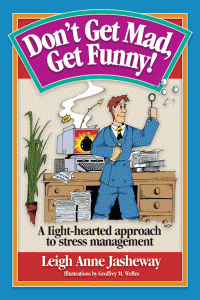
19. Repot a plant. There’s something grounding about putting your fingers in dirt. Ask your dog.
20. Write your five, ten, or fifty biggest worries on giant marshmallows and invite your friends to have a “snowball” fight.
21. Make it a family tradition to have each member of the family tell you a funny joke at dinner every night. Not only will everyone get a chance to lighten up, but by encouraging your kids’ senses of humor, you’ll be helping them develop good stress management skills for the future.
22. Hula hoop or jump rope. You’ll get a quick burst of exercise – which will help produce endorphins and make you feel better all over – and you’ll get in touch with your inner child too. You remember her, right?
23. Put today’s biggest stressor on a sheet of paper in big red letters. Then run the page through your shredder. As it gets ripped apart, imagine the stressor itself disappearing.
24. Update the photos you keep on your desk or on the fireplace mantel. Searching for just the right photos will bring back happy memories and the break will help slow down the hectic pace of your day.
25. Have some milk and cookies. If you can squeeze in another ten minute, have a nap too.
26. Get the whole family to play the board game, Don’t Make Me Laugh (available at Areyougame.com). I dare you not to forget your troubles while you play.
27. Go barefoot. Feeling the grass between your toes or even the fuzzy carpet tickling your arches will help take your mind off your troubles for a few minutes.
28. Have your teenager teach you the latest dance craze. Try to be a good student and not break up laughing halfway through the lesson.
29. Start a list of good excuses for saying “No” the next time you really want to. “I’m sorry, I’m having the ficus tree neutered.” “The voices in the head have been grounded.” “I’m trying to be LESS popular.”
30. Soak your feet in Mr. Bubble.
Trying to fit stress management into your day doesn’t have to stress you out. If you try some of these tips, you’ll be calmer and better able to cope with your life.
© 2007 Leigh Anne Jasheway. Used by permission. Go to her site here.
For more from author Leigh Anne Jasheway, click here.
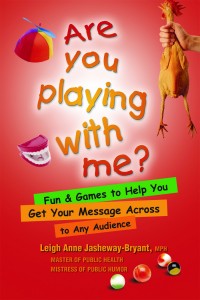 |
 |
Intrinsic motivators feed your success
Motivators Feed Your Success
By Jacquelyn Ferguson
Losing weight, getting out of bed some days, not screaming at a customer; the list of responsibilities and tasks that require motivation to accomplish is a long one.
But what is motivation? Where can we get some?
The thesaurus says that it’s incentive, inspiration, drive, enthusiasm, impetus, stimulus and impulse.
You may lack these for something you don’t want to do but you’re full of them for what you love to do. Think about:
* Something you dread doing;
* Something you love to do;
What motivates you to do each?
For what you dread it may be an external force that’s pressuring you to complete it. Like the threat of losing your house if you mess up on your job or the perceived or actual disapproval of family members if you somehow fail to tow the line.
Consider the vast difference in what motivates you to do what you love. Maybe it’s caring for your grand-kids on a weekend. You love those kids so much that there’s no real motivation that you have to work up; it’s just there. Or perhaps it’s your favorite hobby that you dive into after the work day that exhausts you. Your energy miraculously returns because your hobby captivates and challenges you.
An important difference is that you’re probably intrinsically motivated by what you love to do and have to depend upon extrinsic motivation (threats, pressure, guilt, money, etc.) to force you to do what doesn’t excite you.
The trick to creating motivation for tasks that you don’t feel like doing is to look for and create intrinsic rewards for finishing them.
Intrinsic motivators represent who you are at your core. They’re associated with better mental health and lead you to greater persistence, creativity and life success. They include:
* Your positive values, which are natural motivators;
* Making a contribution;
* Pride in your work;
* Personal and professional growth;
* Meaningful relationships;
Extrinsic motivators and rewards come from outside the self and are associated with poorer mental health, even depression, and create a façade that you must then invest energy into to carrying on. These include:
* Wealth and the stuff it can buy;
* Beauty;
* Fame and adulation;
Self-esteem works in the same manner as motivation: if your perceived value is dependent upon external things like a hot car or a big house, your self-worth will be fleeting. What happens to your confidence if you lose these things? Intrinsic self-esteem based on positive values like love, connection, growth, giving, etc., gives you meaning. These values don’t leave you in hard times like your income and your looks can.
So, what is something you procrastinate doing? Or dread? Or a task that bores you? Which intrinsic motivators could help you accomplish these? Sometimes your only motivator will be a threat, money or other external rewards or punishments. Just know that mental health and success are nourished when intrinsic motivators significantly outnumber your extrinsic ones – more on this next week.
Jacquelyn Ferguson, M. S., is an international speaker and a Stress and Wellness Coach. Order her book, Let Your Body Win: Stress Management Plain & Simple.
Horoscopes for Stressed Out Women
What’s in the stars for stressed out women
By Leigh Anne Jasheway
You know you’re a stressed out woman if your inner child wants to be adopted by someone with more time to play. If you get so anxious driving carpool that there are teeth marks on your steering wheel. If your favorite pizza topping is antacid tablets.
If you have any of these symptoms, read on – these horoscopes are just for you.
Capricorn (December 22-January 19) – You’re always a hard worker, but lately you’ve been overdoing it. Now is the time to put aside your to-do list and take a nice deep breath. But not so deep you inhale the kitty litter from across the room.
Aquarius (January 20-February 18) –Free-spirited Aquarius, you get stressed out by taking on too many projects and need to learn how to say NO. Ask a three-year old, they’re usually very good at the word. If you’re a single Aquarian, it wouldn’t be a bad idea to start dating a massage therapist.
Pisces (February 19-March 20) – Are you looking for a great way to relax at the office? Why not get a fish tank, dear Pisces, and let your worries float away? The good thing about fish is that they never need to be driven to soccer practice or a ballet recital, so don’t even think about buying tiny waterproof cleats or tutus!
Aries (March 21-April 19) – You have to admit that you are often moody and impatient. “Am not!” “Are too!” A great way for you to maintain a more even emotional keel is through aromatherapy. Buy yourself some candles to set the mood you’d like to be in for the day, but resist your impulse to buy two opposing scents such as “Relaxed” and “Perky.”
Taurus (April 20-May 20) – Your tendency to get over-anxious in public can lead to trouble, like that time you bit off the fingernail’s of the woman sitting next to you on that long flight across country. Try visualizing something that makes you feel peaceful inside – for example, an imaginary maid who leaves your house spotless every week without you lifting a finger.
Gemini (May 21-June 20) – Despite your pride in your ability to multi-task, there are some things you should never do at the same time. Like meditating with your eyes closed while driving home from work. Or preparing your taxes while taking a bubble bath. However, since you are also psychic and intuitive, I really didn’t have to tell you any of this, did I?
Cancer (June 21-July 23) – A yoga class would be a great idea right about now, but be sure to stretch out first – you have been kind of tense lately and don’t want to get stuck in the lotus position and have to call the paramedics to bring the Jaws of Life to get you out.
Leo (July 24-August 22) – You pride yourself on your intelligence, so why not put your stress in check by checking out one of the latest books on the subject? You can’t go wrong with What Color is My Blood Pressure; Men are from Mars, Women Have to Clean it Up; or Chicken Soup Someone Else Made Always Tastes Better.
Virgo (August 23-September 22) – Your desire to take care of others is admirable, but please stop going into your neighbor’s house when they are away and dusting. It just adds one more thing to your list; well, two, if you count dealing with the police after you set off their alarm. Re-channel your energy into exercise. And no, twitching doesn’t count as exercise.
Libra (September 23-October 22) – Let’s face it, you’re too darned busy. It’s okay to use press-on nails, but press-on clothes? That’s a little too much. And aren’t you tired of eating your Lean Cuisine™ frozen? Take a few things off your to-do list and enjoy your life. Maybe you’ll even find time to pull your pantyhose all the way up before you leave for work in the morning.
Scorpio (October 23-November 21) – Your coffee habit isn’t healthy. Especially now that you’ve taken to chewing used coffee grounds for your afternoon pick-me-up. Try water instead. You’ll be less jittery and your pupils may return to their original size.
Sagittarius (November 22-December 21) – You’ve got to slow down. Is it really necessary to fast-forward through those sounds of nature tapes you bought to relax to? Maybe it’s time for a vacation: sand, surf, sun anyone? And try not to run any marathons while you’re away.

